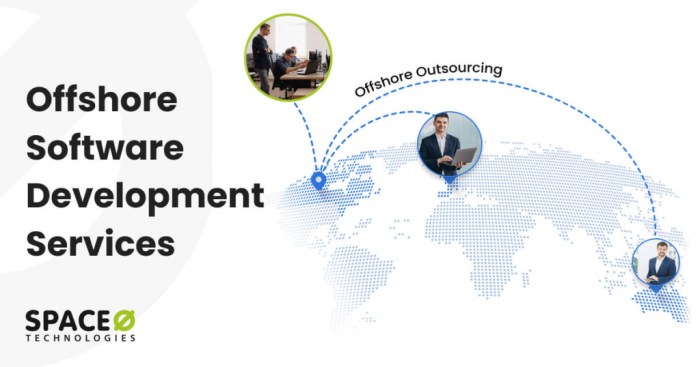In today’s globally interconnected business landscape, leveraging offshore .NET software development services has become a strategic imperative for companies seeking to optimize costs, access specialized talent, and accelerate time-to-market. This comprehensive guide delves into the intricacies of offshore .NET development, exploring its benefits, challenges, and best practices to help you make informed decisions.
Offshore .NET software development services offer businesses access to skilled developers at competitive rates. Finding the right team is key, and leveraging the expertise of established offshore software development teams can streamline the process significantly. This ultimately leads to faster project completion and higher-quality .NET applications for your organization.
Understanding Offshore .NET Development
Offshore .NET development involves outsourcing the development, maintenance, or support of .NET-based applications to a third-party company located in a different country. This often translates to significant cost savings due to lower labor costs in many offshore locations. However, the decision to go offshore requires careful consideration of various factors beyond mere cost reduction.
Benefits of Offshore .NET Development
- Cost Savings: A major driver for outsourcing. Lower labor costs in many countries significantly reduce development expenses.
- Access to Specialized Talent: Gain access to a wider pool of skilled .NET developers with specialized expertise, potentially exceeding the talent available domestically.
- Faster Time-to-Market: Many offshore development teams operate in different time zones, allowing for round-the-clock development and faster project completion.
- Scalability and Flexibility: Easily scale your development team up or down based on project needs without the overhead of hiring and firing domestically.
- Focus on Core Business: Free up internal resources to focus on core business functions instead of managing development projects.
Challenges of Offshore .NET Development
- Communication Barriers: Differences in time zones, language, and cultural nuances can complicate communication and collaboration.
- Quality Control: Ensuring consistent code quality and adherence to project standards requires robust quality assurance processes and clear communication.
- Security Concerns: Protecting intellectual property and sensitive data requires stringent security protocols and choosing reputable offshore partners.
- Time Zone Differences: While offering advantages, time zone differences can sometimes hinder real-time collaboration and immediate problem-solving.
- Managing Remote Teams: Effective project management techniques are crucial for successful collaboration with remote teams.
Choosing the Right Offshore .NET Development Partner
Selecting a reliable and competent offshore .NET development partner is critical to the success of your project. Consider these factors:
Key Considerations When Selecting an Offshore Partner
- Experience and Expertise: Look for a company with a proven track record in .NET development and experience with projects similar to yours.
- Technical Skills and Proficiency: Assess their proficiency in specific .NET technologies (ASP.NET, .NET Core, WPF, etc.) relevant to your project.
- Communication and Collaboration: Evaluate their communication channels, responsiveness, and ability to work effectively in a distributed environment.
- Security and Data Protection: Inquire about their security protocols and data protection measures to ensure the safety of your intellectual property.
- Client References and Testimonials: Check client reviews and testimonials to gauge their reputation and client satisfaction.
- Project Management Methodology: Ensure they use a well-defined project management methodology (Agile, Waterfall, etc.) that aligns with your needs.
- Pricing and Contract Terms: Carefully review their pricing model, contract terms, and service level agreements (SLAs).
.NET Technologies and Offshore Development
Offshore development teams often specialize in various .NET technologies. Understanding these technologies is crucial for selecting the right partner:

Popular .NET Technologies in Offshore Development
- ASP.NET: For building dynamic web applications and websites.
- .NET Core/.NET 5+: Cross-platform framework for building high-performance applications.
- WPF (Windows Presentation Foundation): For creating desktop applications with rich user interfaces.
- Xamarin: For developing cross-platform mobile applications (iOS, Android).
- Entity Framework Core: An Object-Relational Mapper (ORM) for simplifying database interactions.
- Azure DevOps: For seamless integration with Microsoft’s cloud platform.
Best Practices for Offshore .NET Development
Successful offshore .NET development requires careful planning and execution. Implementing these best practices can significantly improve outcomes:
Essential Best Practices
- Clear Communication Plan: Establish clear communication channels and protocols to ensure seamless information flow.
- Detailed Project Documentation: Provide comprehensive documentation, including requirements, specifications, and design documents.
- Regular Progress Monitoring: Implement regular progress meetings and reporting mechanisms to track project milestones.
- Robust Quality Assurance: Establish rigorous quality assurance processes to ensure high code quality and functionality.
- Secure Data Transfer and Storage: Implement secure data transfer and storage protocols to protect sensitive information.
- Cultural Sensitivity and Understanding: Be mindful of cultural differences and adapt your communication style accordingly.
Frequently Asked Questions (FAQ)
Here are some frequently asked questions about offshore .NET software development services:

- Q: How much does offshore .NET development cost? A: The cost varies greatly depending on factors such as project complexity, developer expertise, location, and contract terms. It’s essential to obtain detailed quotes from multiple providers.
- Q: How can I ensure the quality of the code delivered by an offshore team? A: Implement rigorous quality assurance processes, including code reviews, unit testing, and integration testing. Choose a partner with a strong track record and established QA procedures.
- Q: What are the risks associated with offshore .NET development? A: Risks include communication challenges, security concerns, quality control issues, and potential time zone differences. Mitigating these risks requires careful planning, robust communication strategies, and choosing a reputable partner.
- Q: How do I manage an offshore development team effectively? A: Utilize project management tools, establish clear communication channels, and conduct regular progress meetings. Consider using Agile methodologies for better collaboration and flexibility.
- Q: What are the legal and contractual considerations when outsourcing .NET development? A: Carefully review contract terms, intellectual property rights, confidentiality agreements, and service level agreements (SLAs) before signing any contract. Seek legal counsel if necessary.
Conclusion
Offshore .NET software development offers numerous benefits, including cost savings, access to specialized talent, and faster time-to-market. However, it also presents challenges that require careful planning and execution. By selecting a reputable partner, implementing best practices, and addressing potential risks, companies can successfully leverage offshore development to achieve their business objectives.
Call to Action
Ready to explore the potential of offshore .NET development for your next project? Contact us today for a free consultation and let us help you find the perfect offshore development partner.
